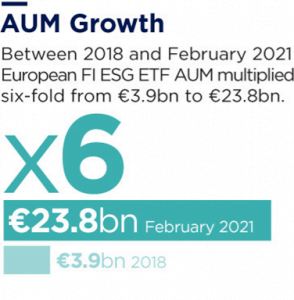Fixed Income: Making ground in ESG
Deel dit bericht
Fixed income has long lagged equities in the environmental, social and governance (ESG) investing space, currently accounting for only around 9% of sustainable assets globally1. But this is beginning to change. Demand for ESG debt is on the rise as is the availability of efficient passive ESG fixed income solutions, particularly since the outbreak of Covid-19. As increasingly socially conscious investors re-evaluate their allocations to fixed income, this presents significant investment opportunities.
A slow start but…
Compared to equities, progress to integrate ESG considerations into fixed income portfolios has been slow. The very first equity ESG index was launched over three decades ago, in 1990, but it was not until 2013 that the first ESG fixed income index materialised.
One reason for this relates to historically perceived issues with engagement. Bondholders do not have voting rights like shareholders leading to a myth that they had a limited ability to engage and exert influence on companies.
However, times are changing fast and there is growing investor demand for ESG fixed income solutions. For example, between January 2018 and February 2021 assets under management in European fixed income ESG ETFs increased by six times to € 23.8 billion. So what has brought about this change and what opportunities does this bring?

Making Ground
It is not hard to understand the potential benefits of incorporating ESG analysis into fixed income investing. ESG scrutiny on a corporate issuer may for instance reveal exposure to long-term investment risks such as climate change that may take years to materialise. Indeed, it is increasingly recognised that companies with strong ESG credentials are less likely to default. They are also likely to be more profitable over the long term and numerous studies attest to this.
In light of this, asset managers have been working hard to develop solutions that combine ESG with fixed income. ESG factors are occupying a more important role in credit ratings and we are seeing greater ESG integration and issuer engagement.
Bond investors, such as asset managers, are showing a greater willingness to directly communicate with companies and hold them to account on ESG issues. They recognise that whilst they may not have voting rights like equity holders, this in no way lessens their right, as stakeholders, to engage with bond issuers who are in many cases also stock issuers.
Bond issuers, keen to attract increasingly socially conscious investors and be included on the major indices, are now far more forthcoming in supplying information. There is also more information available from ESG information providers on previously neglected areas such as government debt. Government debt is far less advanced than corporate debt in terms of ESG integration for a host of reasons including a lack of consistency with regards to measuring material ESG factors, limits to data availability and less well-developed ESG integration tools and practices. However, increased investor scrutiny on ESG issues is driving progress in this area.
Of late, this trend towards greater ESG integration in fixed income has gathered newfound momentum. This has been accompanied by a greater investor adoption of fixed income ESG ETFs.
2020: The year that ESG went mainstream
Covid-19 precipitated market turmoil, and proved a real test of portfolio resilience leading many investors to re-evaluate their allocations to fixed income. Yet amidst the volatility, ETFs thrived, proving nimble and resilient and laying to rest any concerns that the passive universe would dry up in a market crisis. Notably, large volumes of fixed income ETFs were traded, even in segments with dwindling liquidity. Monetary authorities — including the Bank of England, the Bank for International Settlements and the Federal Reserve — recognised their versatility and even highlighted the role of ETF prices as a means of price discovery, again, particularly in the fixed income space.
The pandemic also sharpened investor focus on ESG illustrated by significant in-flows of € 60 billion in European ESG ETFs in the 12 months to February 2021, including € 15 billion in fixed income2.
ETFs embraced as the vehicle of choice
Demand for fixed income ESG ETFs has since soared as shown by a survey, which found that over 80% of investment professionals wanted to see more innovation within fixed income ESG ETFs3.
Their attraction is clear:
• They are low cost, allowing investors to incorporate sustainability into a portfolio at a fraction of the cost of an active fund.
• They offer transparency – investors can see what is in the portfolio by looking at the constituents of the underlying index.
• They provide diversification and resilience – risk can be spread across hundreds, even thousands of stocks.
• They are highly liquid – as discussed – even in times of market stress.
• They offer a high correlation with their parent (non-ESG) universe and minimal tracking error.
The increasing investor appetite for fixed income ESG ETFs has and will continue to drive greater product innovation and choice for investors. Over the past two years the proportion of fixed income ETFs incorporating ESG criteria has increased from 4% to 12%4 and in the first quarter of 2021 we witnessed a significant investor shift towards ESG fixed income ETFs. European fixed income ESG ETFs saw net flows of € 9 billon versus a total of € 5 billion for the asset class overall.
There’s a long road ahead but…
ESG progress in the fixed income market has a long way to go. There is still a lack of consistency in the level of ESG information provided by bond issuers, particularly within the sovereign debt space, making ESG due diligence challenging. And fixed income assets still only account for a small proportion of sustainable assets globally.
But with sustainable investing increasingly seen as a necessity as opposed to a luxury in managing long term investment risks such as climate change, things are fast improving.
ETFs are increasingly being embraced as the vehicle of choice to implement ESG fixed income in investment portfolios and we expect continued innovation and assets under management in these dynamic tools to surge. Ultimately this should lead to greater choice for investors and an enhanced ability to incorporate sustainability in their investment portfolios in a way that reflects their beliefs and objectives.
About Amundi ETF
Amundi is a recognised European leader in the ETF market and offers over 150 ETFs5 across all main asset classes, geographic regions and a large number of sectors and themes. Amundi is leading the ESG transformation and its ETF, Indexing and Smart Beta platform is known for its wide range of high-quality, cost-effective ESG solutions spanning equity and fixed income and a range of levels of ESG intensity. To learn more about Amundi’s ESG Fixed Income ETFs, visit https://www.amundietf.nl/professional/Investing-in-ETF/Responsible-Investing
Important Information
This document is not intended for citizens or residents of the United States of America or to any “U.S. Person”, as this term is defined in SEC Regulation S under the U.S. Securities Act of 1933. The “US Person” definition is provided in the legal mentions of our website www.amundi.com. Investors are subject to the risk of loss of capital. Promotional & non-contractual. Information which should not in any way be regarded as investment advice, an investment recommendation, a solicitation of an investment offer, or a purchase of any financial securities. The accuracy, completeness and relevance of the information, forecasts and analyses provided are not guaranteed. They have been prepared from sources considered reliable and may be altered without prior notice. The information and forecasts are inevitably partial, provided on the basis of market data observed at a particular moment, and are subject to change. This document may contain information from third parties that do not belong to Amundi (“Third Party Content”). Third Party Content is provided for information purposes only (for illustration, comparison, etc.). Any opinion or recommendation contained in Third Party Content derives exclusively from these third parties and in no circumstances shall the reproduction or use of those opinions andcommendation by Amundi AM constitute an implicit or explicit approval by Amundi AM. Information reputed exact as of January 2019.
Reproduction prohibited without the written consent of the Management Company. Amundi ETF designates the ETF business of Amundi Asset Management. This Document was not reviewed/stamped/approved by any Financial Authority. Amundi ETF funds are neither sponsored, approved nor sold by the index providers. The index providers do not make any declaration as to the suitability of any investment. A full description of the indices is available from the providers. This document is being issued inside the United Kingdom by Amundi which is authorised by the Autorité des marchés financiers and subject to limited regulation by the Financial Conduct Authority (“FCA”). Details about the extent of regulation by the FCA are available on request. This document is only directed at persons who are professional clients or eligible counterparties for the purposes of the FCA’s Conduct of Business Sourcebook. The investments described herein are only available to such persons and this document must not be relied or acted upon by any other persons. This document may not be distributed to any person other than the person to whom it is addressed without the express prior consent of Amundi.
Amundi Asset Management, French “Société par Actions Simplifiée” – SAS with capital of €1,086,262,605 – Portfolio Management Company approved by the AMF (French securities regulator) under no. GP 04000036 – Registered office: 90 boulevard Pasteur, 75015 Paris – France. 437 574 452 RCS Paris.
Footnotes
1 Source: Morningstar: Global Passive ESG Landscape 2020
2 Source: Bloomberg Finance LP – Amundi ETF. From end of February 2020 to end of February 2021.
3 Source: Tabula Investment Management, July 2020
4 Source: Amundi ETF as of end February 2021
5 Source: Amundi ETF as of end of March 2021
"The best investment you can make is an investment in yourself.
The more you learn, the more you will earn."
- Warren Buffett
Ontvang de nieuwsbrief
Schrijf je in voor één van de drie nieuwsbrieven en blijf op de hoogte over precies datgene wat jou interesseert.
• Maandelijkse nieuwsbrief
• Nieuwsbrief ETF's
• Nieuwsbrief aandelen

© 2025 Markets Are Everywhere.
Alle rechten voorbehouden

